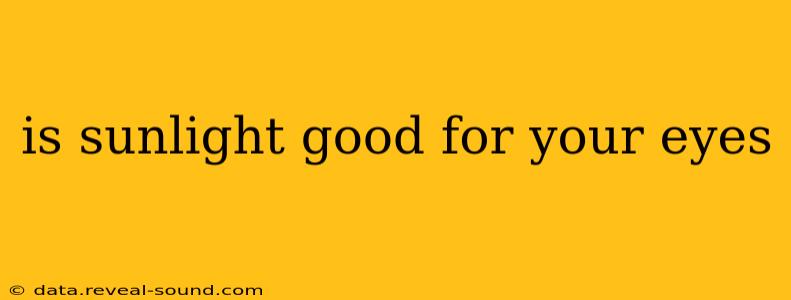Sunlight plays a complex role in eye health. While it offers some benefits, excessive exposure can be detrimental. This article will explore the nuanced relationship between sunlight and your eyes, addressing common concerns and providing actionable advice.
What are the benefits of sunlight for your eyes?
One key benefit of sunlight is its role in vitamin D production. Vitamin D is crucial for overall health, including eye health. It's believed to play a role in protecting against age-related macular degeneration (AMD), a leading cause of vision loss. However, it's important to note that getting vitamin D through sunlight exposure isn't the only, or necessarily the best, way to ensure sufficient levels. Dietary sources and supplements are also effective.
Sunlight also contributes to our circadian rhythm, regulating our sleep-wake cycle. This rhythm directly impacts eye health, as insufficient sleep can strain eyes and increase the risk of eye problems. Exposure to natural light helps regulate this cycle, promoting better sleep and overall eye well-being.
Is sunlight harmful to your eyes?
Yes, excessive exposure to sunlight can be harmful to your eyes. The primary risk is UV radiation, which can damage the eye's delicate tissues, leading to several issues:
- Photokeratitis: This is a painful sunburn of the cornea, often caused by intense UV exposure, like from snow or water reflection.
- Cataracts: Long-term exposure to UV radiation significantly increases the risk of developing cataracts, clouding of the eye's lens that can lead to blurry vision.
- Macular degeneration: While vitamin D from sunlight might offer some protective effects, excessive UV radiation is a known risk factor for age-related macular degeneration.
- Pterygium: This is a growth of tissue on the conjunctiva (the membrane covering the white part of the eye) that can affect vision if it grows large enough.
How much sunlight is too much for my eyes?
There's no single answer to this question, as it depends on several factors including:
- Time of day: UV radiation is strongest between 10 a.m. and 4 p.m.
- Altitude: UV radiation increases with altitude.
- Weather conditions: Sunlight is more intense on clear, sunny days.
- Your skin and eye type: Some individuals are more susceptible to sun damage than others.
However, it's generally recommended to protect your eyes from the sun whenever it is strong. This means wearing sunglasses that block both UVA and UVB rays, and seeking shade during peak sun hours.
What type of sunglasses should I wear to protect my eyes from the sun?
When selecting sunglasses for sun protection, look for those that meet the following criteria:
- UV protection: Ensure the sunglasses block 99-100% of both UVA and UVB rays.
- Wrap-around style: This design helps to reduce the amount of sunlight that enters from the sides.
- Dark lenses: Darker lenses don't necessarily offer better protection but can be more comfortable in bright sunlight.
Can I get too much Vitamin D from sunlight?
While it's difficult to get toxic levels of vitamin D from sunlight alone, excessive exposure can lead to other health problems, such as sunburn and eye damage, as discussed earlier. Therefore, focusing solely on sunlight for vitamin D intake isn't recommended. A balanced approach with a varied diet and/or supplements is preferable.
What other eye protection measures should I take?
Beyond sunglasses, consider these additional measures:
- Wide-brimmed hats: These help shade your eyes and face from direct sunlight.
- Regular eye exams: Early detection of eye problems is crucial for effective treatment.
- Protective eyewear: When engaging in activities like welding or working with chemicals, always use appropriate protective eyewear.
In conclusion, sunlight offers some minor benefits to eye health, primarily through vitamin D production and circadian rhythm regulation. However, the potential risks associated with UV radiation exposure far outweigh these benefits if proper protection isn't taken. Prioritizing eye protection through sunglasses, hats, and regular eye exams is essential for maintaining long-term eye health. Remember to consult with an ophthalmologist for personalized advice on sun protection for your eyes.
